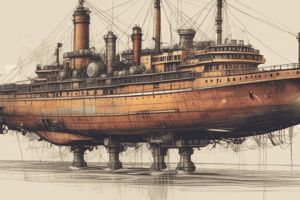Podcast
Questions and Answers
What years were the tariffs enacted?
What years were the tariffs enacted?
- 1816, 1824, and 1828 (correct)
- 1820, 1830, and 1840
- 1814, 1822, and 1826
- 1800, 1810, and 1820
What was the Tariff of 1816?
What was the Tariff of 1816?
It raised the tariff rate to 20%.
What were the positions of the North and South regarding the Tariff of 1816?
What were the positions of the North and South regarding the Tariff of 1816?
The North hated it, while the South and West loved it.
What was the tariff rate for the tariff of 1824?
What was the tariff rate for the tariff of 1824?
What was the tariff of 1828 commonly called?
What was the tariff of 1828 commonly called?
What was the Nullification Crisis?
What was the Nullification Crisis?
The tariff of 1828 raised the rate to ___%.
The tariff of 1828 raised the rate to ___%.
The North was favorably impacted by the tariffs during 1816-1828.
The North was favorably impacted by the tariffs during 1816-1828.
Flashcards are hidden until you start studying
Study Notes
Tariff Overview (1816-1828)
- Key years of tariff legislation: 1816, 1824, 1828
- The tariffs aimed to protect American industries, particularly in the North.
Tariff of 1816
- Increased tariff rate to 20%.
- Advocated by Henry Clay and John Calhoun to support industrialization in the South and West.
- Northern opposition due to reliance on shipping and trade, which was financially impacted by the tariff.
- Southern and Western support aimed at diversifying the economy beyond agriculture.
Tariff of 1824
- Raised tariff tax to 37%.
- Viewed negatively by the South and West, which had lagged in industrial growth.
- Northern industries benefited as they had started to industrialize and relied less on imported goods.
Tariff of 1828 (Tariff of Abomination)
- Imposed a steep tariff rate of 46%.
- Aimed primarily to protect Northern manufacturing interests.
- Signed by John Quincy Adams, controversial as it was expected to affect his re-election chances.
- Enhanced Andrew Jackson's image in the North as a protectionist leader.
- Resulted in Britain seeking alternative trade partners, adversely affecting Southern economies.
Nullification Crisis
- Stemmed from the Tariff of 1828, led to South Carolina's attempt to nullify the tariff.
- A confrontation emerged between South Carolina and the federal government regarding the tariff's validity.
- South Carolina failed to successfully nullify the federal law, receiving limited support from other states.
Studying That Suits You
Use AI to generate personalized quizzes and flashcards to suit your learning preferences.




